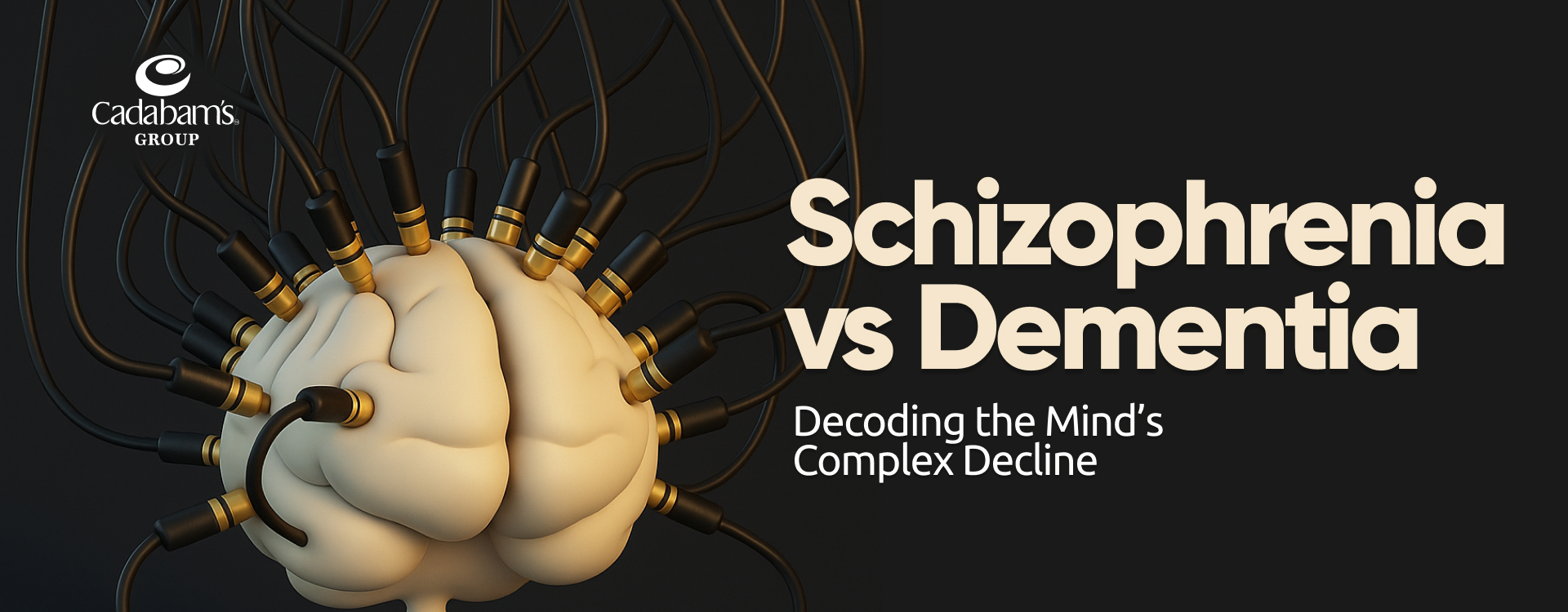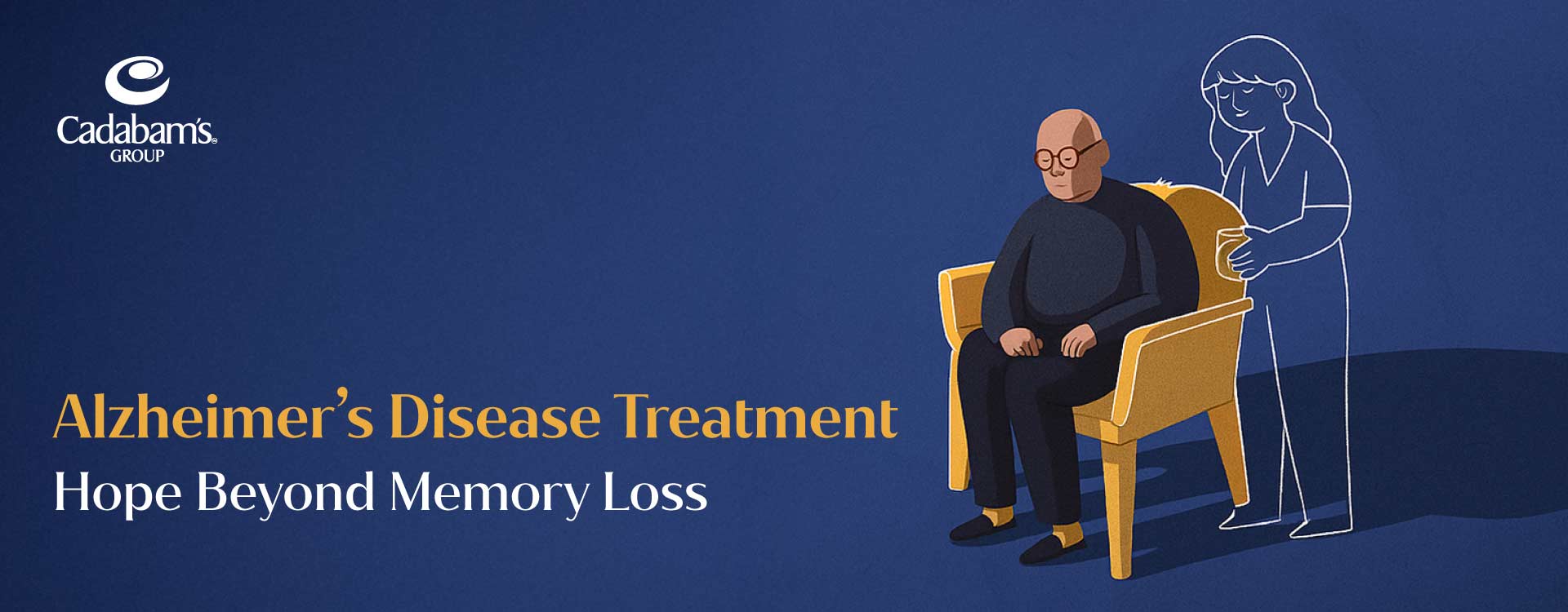Dementia
Dementia is a disorder that usually occurs in old age. It is characterised by a group of symptoms which include overall cognitive decline, impairment in memory, language, judgement, and behaviour. The disorder is chronic and progresses over time. Dementia is a result of damage to the brain due to a loss of neural connections and the slow destruction of cells in the brain.
The symptoms of dementia can lead to intense anxiety and paranoia in individuals with the disorder. Caregivers also experience distress while taking care of their loved one, which may take a severe toll on their wellbeing. At Cadabam’s, our multispecialty team of mental health professionals offer excellent care in geriatric psychiatry, as well as caregiver support.
Signs and Symptoms of Dementia
Cognitive Changes
- Memory loss
- Communication difficulties
- Visual/spatial problems
- Impaired reasoning
- Complex task challenges
- Planning/organizing issues
- Motor decline
- Confusion/disorientation
Psychological Changes
- Personality changes
- Depression
- Anxiety
- Agitation
- Inappropriate behavior
- Paranoia
- Hallucinations
Our Professionals
Causes of Dementia
Causes of dementia include brain cell damage from Alzheimer's disease, vascular issues, Lewy bodies, frontotemporal degeneration, and reversible conditions like vitamin deficiencies.
Brain Cell Damage
Dementia often stems from damage to brain cells, which affects their ability to communicate with each other, impacting cognitive functions such as memory, judgment, and movement. Conditions like Alzheimer’s disease lead to the buildup of abnormal proteins that disrupt cell function. This widespread damage can lead to significant impairment in various brain areas responsible for different functions.
Vascular Issues
Vascular dementia is caused by conditions that block or reduce blood flow to the brain, depriving brain cells of oxygen and nutrients. This can result from stroke or smaller blood vessel damage over time, leading to cumulative effects on brain function. Vascular issues can cause cognitive decline that is second in prevalence only to Alzheimer’s disease in older adults.
Progressive and Irreversible Dementias
Many forms of dementia, such as Alzheimer’s disease, Lewy body dementia, and frontotemporal dementia, are progressive and irreversible. These conditions gradually worsen as more brain cells are affected over time. Treatment can manage symptoms but cannot stop the disease's progression, highlighting the importance of early diagnosis and intervention.
Other Contributing Factors
Besides the primary causes, several other factors can contribute to the development of dementia, including genetics, lifestyle, and environmental factors. For example, a history of head injuries, heavy alcohol use, and air pollution have been linked to an increased risk of dementia. Managing these risk factors can help prevent or delay the onset of dementia symptoms.
Reversible Causes of Dementia
Some underlying issues may present with dementia-like symptoms, which can be reversed with appropriate treatment.
- Normal Pressure Hydrocephalus (NPH) is characterized by the accumulation of cerebrospinal fluid in the brain ventricles, affecting walking, bladder control, and cognitive functions, which can improve with surgical intervention.
- Vitamin deficiencies, particularly B vitamins, can mimic dementia but are treatable with nutritional supplements.
- Infections affecting the brain, such as HIV or Lyme disease, can lead to dementia symptoms that may be reversible with antimicrobial therapy.
- Metabolic and endocrine disorders, like thyroid problems or diabetes, can cause cognitive impairment, which often improves with medical management of the underlying condition.
- Additionally, side effects from certain medications can induce dementia-like symptoms, which typically resolve upon adjusting or discontinuing the medication.
Risks of Dementia
The risks of developing dementia increase with age, genetic predisposition, and lifestyle factors. Conditions like cardiovascular disease, diabetes, and obesity further elevate the risk, as do smoking, excessive alcohol consumption, and physical inactivity. A family history of dementia indicates a higher genetic likelihood of developing the condition. Head injuries and exposure to environmental pollutants can also contribute to the risk. Engaging in protective behaviors like regular exercise and a healthy diet may reduce these risks.
Understand the various aspects of this condition

Common Types of Dementia
Common types of dementia include Alzheimer's disease, vascular dementia, Lewy body dementia, and frontotemporal dementia.
Primary Dementia
Primary dementia types are directly related to brain cell damage.
- Alzheimer's Disease is the most common form, characterized by the buildup of amyloid plaques and tau tangles in the brain, leading to memory loss and cognitive decline.
- Vascular Dementia results from impaired blood flow to the brain, causing cell death.
- Lewy Body Dementia involves abnormal protein deposits in brain cells, affecting thinking and movement.
- Frontotemporal Dementia (FTD) is the degeneration of the frontal and temporal brain lobes, which impacts personality and language.
- Mixed Dementia refers to the presence of characteristics of more than one type of dementia simultaneously, often combining Alzheimer's and vascular dementia.
Secondary Dementia
Secondary dementia is associated with another disease or injury indirectly affecting the brain.
- Huntington’s Disease, a genetic disorder, leads to progressive brain cell degeneration, affecting movement and cognition.
- Parkinson’s Disease, primarily known for its movement symptoms, can also lead to dementia symptoms in its advanced stages.
- Creutzfeldt-Jakob Disease is a rare, degenerative brain disorder characterized by rapid neurological decline.
- A vitamin B1 deficiency causes Wernicke-Korsakoff Syndrome, often linked to alcohol abuse, leading to severe memory problems.
- Traumatic Brain Injury can result in changes in brain function, potentially leading to dementia symptoms depending on the injury's severity and location.
Find nearest mental health center now

Rehabilitation for Dementia
Rehabilitation for Dementia becomes a necessity during the moderate and severe stages. Individuals become fall risks and pose the risk of wandering off. Families also find it difficult to manage their loved ones at home as they have their own responsibilities and problems. This is when dementia care units and rehabilitation become very important. They provide trained interventions for the individual and respite from caregiving duties to the families.
“Rehabilitation for dementia is largely about keeping the elderly individuals engaged and preventing rapid deterioration of the individuals condition. There are multiple types of rehab- short-term rehab, long-term rehab and day-care facilities. The challenge is to ensure that the elderly remain engaged and their time is being effectively used,” explains Dr. Priya about rehabilitation for Dementia.
Transforming Dementia Care for Better Lives at Cadabams
At Cadabams, transforming dementia care is central to fostering better lives for those affected. Through personalized treatment plans, rehab programs, innovative therapies, and a holistic approach, Cadabams ensures comprehensive support for individuals and their families. Emphasizing dignity and respect, the center integrates medical, psychological, counselling and social interventions to address the unique challenges of dementia. Cadabams’ commitment to advanced care and rehabilitation empowers individuals to navigate their journey with confidence and improved well-being.
Listen to Our Expert Insights on Dementia
Our centres where we treat Dementia
Diagnosis of Dementia
To accurately diagnose dementia, it's essential to distinguish it from other psychiatric conditions that share similar symptoms. Additionally, a comprehensive assessment is crucial because the disease progresses through various stages.
The diagnostic process for dementia includes:
- Screening for dementia
- Evaluating physical symptoms
- Assessing current medications
- Conducting blood tests
- Performing imaging scans
- Psychological evaluations
Dementia Prevention and Risk Reduction
Preventing dementia and reducing risk involves lifestyle modifications and managing health conditions. Physical activity, a healthy diet, cognitive stimulation, and social engagement can reduce risk. Controlling hypertension, diabetes, and cholesterol, along with avoiding smoking and excessive alcohol consumption, is crucial. Additionally, wearing protective gear during activities to prevent head injuries can contribute to dementia risk reduction.
When to See a Doctor?
Consulting a doctor is advisable when persistent memory problems, difficulty with daily tasks, changes in mood or behavior, and trouble with language or visual perception are noticed. These symptoms may indicate dementia or other treatable conditions. Early diagnosis allows for the management of symptoms and planning for the future. It's also important for individuals with a family history of dementia to discuss preventive measures with their healthcare provider.
Treatment of Dementia
An early diagnosis of dementia can make it easier to manage symptoms of dementia. Its treatment requires specific symptoms such as memory loss, language, problem-solving, etc. to be treated individually. Though there is no cure for Dementia, Cadabam’s is the best center for dementia treatment, where we strive to improve the functioning of the brain and memory.
There are primarily two types of dementia treatment available to manage symptoms of dementia. These include medication and occupational therapy.
- Medication:
Several types of medication are used to help increase levels of neurotransmitters in the brain that may slow down the effects of dementia. An example of this is Cholinesterase Inhibitors which help to delay the worsening of Alzheimer’s symptoms, and thus of dementia as well.
It is important to note that medication should only be prescribed by a psychiatrist and that side effects should be taken into consideration before medicating.
- Occupational Therapy:
Occupational Therapy is an effective way to manage dementia symptoms. It helps the individual to regain functionality with the guided help of caregivers. This therapy aims to help the patient understand how to do daily tasks such as bathing, dressing or eating properly.
- Lifestyle Changes:
Along with medication and therapy, it is also suggested that the individual follows a healthy meal plan with dietary supplements and herbal remedies. Vitamin B9, B12 and Vitamin E are also suggested to potentially delay the onset of dementia.
At Cadabam's, we realise that the family members of the individual with dementia may also go through distress. Hence, our treatment modalities include family therapy and caregiver support to ensure that your emotional wellbeing is maintained while you take care of your loved one.
Find out about centres, daily updates and more about mental health

Why Choose Cadabams for Dementia?

33+ years of focused mental healthcare, shaped by 1000+ real patient journeys.

State of the art mental health centres built for treatment and recovery.

A coordinated team of psychiatrists, psychologists, counsellors, and rehabilitation specialists supporting your care.

Support from early signs through treatment and recovery.

Treatment guided by clear plans that continue beyond diagnosis.

Planned follow ups and continued guidance to help maintain progress over time.
Facilities & Amenities
Frequently Asked Questions
Some forms of dementia, like early-onset familial Alzheimer’s disease, have a strong genetic component, but most cases are influenced by a combination of genetics, lifestyle, and environmental factors. Having a family history may increase risk, but it does not guarantee someone will develop dementia.
While dementia cannot be completely prevented, certain lifestyle choices can reduce the risk or delay its onset. Regular physical activity, a healthy diet, mental stimulation, quality sleep, social engagement, and managing cardiovascular risk factors like blood pressure and diabetes all contribute to brain health and lower dementia risk.
Early signs of dementia are short term memory loss, problems in decision making, difficulty completing familiar tasks, social withdrawal, confusion with time and place, forgetting loved ones, etc
Symptoms of dementia include memory loss, difficulty concentrating, decline in conversational skills, forgetting the right words; unexplained changes in mood, behaviour and personality and also confusion about time and place.
There is no actual treatment for dementia as it is a chronic disorder. However, treatment slows down the spread of symptoms. Treatment involves medication, therapy, exercise and also a healthy diet.
There are many causes - brain cells death, injuries to the head, genetic influences, strokes, substance abuse and smoking. Diseases like Alzheimer’s, Parkinson’s, HIV can also cause dementia.
Case Studies
Our Programs
Our Testmonials
Blogs you may be interested in
Helpline at your fingertips
+91 9611194949

.webp)








-min.webp)



.avif)

-min.webp)

.avif)

.avif)
.webp)































